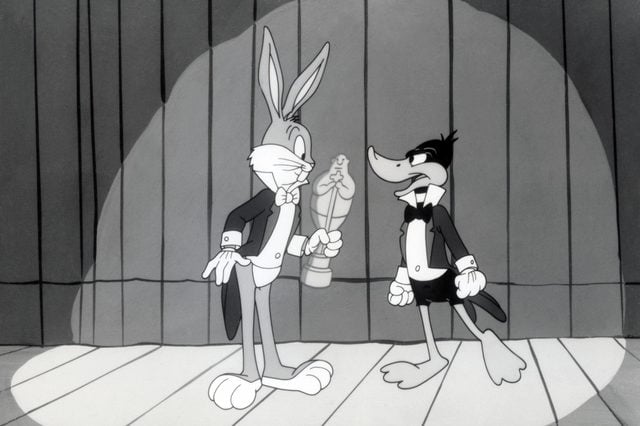Finally! Here’s Why “Looney Tunes” Is Not “Looney TOONS”
Updated: Feb. 07, 2023
They're cartoons, not songs, so...what gives, Doc?
 Ah, homophones. When two words sound the same but have different spellings and meanings, confusion is sure to follow. (Thanks for being so confusing, English.) That confusion reaches a whole new level when one of those words is used in a case where it seems the other one should be there instead. This is exactly the case for the beloved cartoon series that gave us Bugs Bunny and Tweety Bird: Looney Tunes.
Ah, homophones. When two words sound the same but have different spellings and meanings, confusion is sure to follow. (Thanks for being so confusing, English.) That confusion reaches a whole new level when one of those words is used in a case where it seems the other one should be there instead. This is exactly the case for the beloved cartoon series that gave us Bugs Bunny and Tweety Bird: Looney Tunes.
Yes, Tunes, like songs—not “toons,” as in “cartoons.” Calling them “tunes” seems like a misnomer—or just a misspelling.
Luckily, we were able to chat with Bob Bergen, the current voice actor for Porky Pig, who helped us get to the bottom of it.
Bergen fell in love with Looney Tunes as a young child (and, at five years old, made it his life’s mission to become Porky Pig. Dreams do come true, guys.) After moving to LA and spending years learning everything there was to know about voice acting, Bergen finally achieved his dream of becoming Porky in 1990—and has been living it for 27 years. He also provides the voice for Tweety Bird. But Bergen admits that even he was confused at first about the Tunes/Toons distinction.
However, there is a logical explanation, and it dates back to the 1920s. In the early days of animation, Disney produced short animated films, set to music, called “Silly Symphonies.” The most famous of these is probably “The Three Little Pigs.” The purpose of these mini-movies, Bergen explains, was to promote and sell music, in the form of records and sheet music. “Back then, before people had TVs, the thing to do was to buy sheet music and play…piano,” he told Reader’s Digest. “Sheet music sales were huge, a huge part of the profits of the studios. This was [the] pop music of the day.”
As Disney’s Silly Symphonies gained popularity, Warner Brothers, another major entertainment studio, created its own equivalent. They produced two different song-based series: “Merrie Melodies” and—you guessed it—“Looney Tunes.” As for the “looney” part of the title, Warner Brothers wanted to indicate that “[their] cartoons were a little wackier than the sweeter characters of Disney,” according to Bergen.
Eventually, of course, these tune-filled toons eventually lost their music-marketing purposes as the entertainment industry evolved. “After a while, [they were about] Bugs, Daffy, Porky, Tweety; they didn’t have anything to do with music,” says Bergen. The fact that “tunes” sounds exactly like “toons,” which seems like it would be a more fitting name nowadays, is a complete coincidence.
Bergen says that there was likely scuttlebutt about “tunes” vs. “toons” for many years, but it wasn’t until the 1990s—and the rise of the Internet—that it became a popular source of public confusion. Plus, Warner Brothers themselves complicated matters by releasing a series called “Tiny Toon Adventures.”
Bergen says that people ask him about the name all the time. A surprising number of people, in fact, are fully convinced it was an error. They “think it was a typo…[and] that [Warner Brothers] were just like, ‘let’s just live with it,'” Bergen says.
But, of course, there was a method to Warner Brothers’ madness. Or is it looney-ness?
Here’s how Looney Tunes helped one happy couple fall in love.
